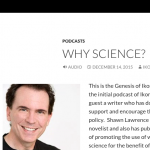Uncategorized
One of my New Year's resolutions is to pay more attention to my blog, so let's kick off the year by considering what showed up in my mailbox today.
Though I have recently been less active on the creationism beat than I have been in the past, I am still on a handful of creationist mailing lists. As a result, I periodically receive the newsletter of Creation Ministries International, a young-Earth group. Each issue invariably contains a testimonial or two, and this one contained a real corker. Two people identified simply as “Bernhard and Louise K.” wrote it to say this:
We want to thank…
I'm a bit pressed for time today, so I've chosen a simple, but very charming, problem for you this week. This was composed by Fritz Giegold and Herbert Engel in 1973. White is to play and mate in five:
Things certainly look bad for black, since he's boxed in and hard up for moves. But considerable ingenuity is needed to deliver checkmate in just five moves. We'll get right to the action. The key move is 1. Bg1!
Like all good keys, it's a seemingly pointless move. Black only has two legal moves in reply. The first leads white to sacrifice his knight on h6: 1. ... cxb4 2. Bxb6 b3…
This is the first popup book I've ever reviewed and I certainly hope it won't be the last.
David Macaulay's How Machines Work: Zoo Break! is a wonderful, whimsical, delightful and beautiful book that will charm and fascinate anyone who picks it up.
Aimed at younger children and told through the eyes of two zoo animals named Sloth and Sengi, it takes a pretty solid engineering approach to the world. It focuses on the core principles of how machines work and cleverly uses a popup devices on many pages to illustrate and even demonstrate those principles. Leverage and levers, wheels and pulleys…
August Berkshire of Minnesota Atheists has organized an Atheist Talk radio show for tomorrow, Sunday Morning, in which various people will discuss many of the top science stories of 2015.
The idea is for each guest to take the Discover Magazine's top 100 stories of 2015, pick a subset of ten, and have at them. Some subset of Brianne Bilyeu, August Berkshire, Maddy Love, and me will be on the show, but I think there may have been a cancellation, not sure who, other than that it wasn't me who will not be there. Anyway, it will be an interesting show ... what are the top stories, and why pick…
I have a paper out in the Christmas issue of BMJ on the coming zombie apocalypse.
You read that right. And yes, it was peer-reviewed.
I've discussed previously how I've used the attention paid to zombies to talk about infectious diseases with children and other audiences; and to bring some science to the Walking Dead and other zombie tales. I even include a zombie lecture as part of the talks I give in my position as an American Society for Microbiology distinguished lecturer.
Why?
Like them or hate them, zombies are part of the zeitgeist. The Walking Dead is still one of the…
With the imminent release of Star Wars: The Force Awakens, you might want to refresh your memory by watching the earlier Star Wars films, or even the films and other related productions.
There are two or three philosophies on this. The most obvious is to watch the films in chronological order, or story order, so you are seeing the historical development of the things that happened. This is simple. Watch Episode I first, and work your way in order through Episode VI.
There are objections to this method, however, because the way the story was told, out of historical sequence, involves…
To paraphrase Walter Brooke playing Mr. McGuire, in his conversation with Dustin Hoffman's character Ben in The Graduate, "Just one word ... are you listening? ... Plasticity. Its a great future. Enough said."
Read about this interesting new research in my latest post at 10,000 Birds blog!
As you may know, Mike Haubrich and I have been planning to develop a podcast. Well, we did it, and you can visit the first episode here.
In this episode, Mike and I discuss some of the reasons behind why we created Ikonokast, and interview writer and science policy expert Shawn Otto. We touch on the recent Paris climate conference, Ted Cruz as the freshest face of absurd over the time science denialism, Shawn's new novel, his forthcoming book on science policy, and the ScienceDebate.com project.
Ikonokast has a web site, and each podcast will be shown presented in a blog post, at least for…
This week I have a classic direct-mate problem for you. It comes from the great Soviet composer Lev Loshinsky and was published in 1947. Loshinsky's last appearance in Sunday Chess Problem was almost two years ago, so it is well past time to see another of his works. White is to move and mate in three:
Perhaps you would like to have a go at solving this yourself. As a hint, the problem's theme is nowadays referred to as the Loshinsky magnet.
OK, here goes. The key move is 1. Qb1!.
This moves provides a masked guard of e4, which is to say that when the white rook on d3 moves away,…
This might be too inside baseball for a lot of people, but those who have been reading political bogs for a long time might find it interesting. BuzzFeed has a lengthy profile of Mickey Kaus.
When I first started taking politics seriously in the mid-nineties, Kaus was a writer for The New Republic, and a very good one at that. He was someone I paid a lot of attention to. He was very much in the mold of Michael Kinsley, who at that time was basically the go-to guy for sensible liberal commentary. He was also one of the first serious political bloggers, largely responsible for defining the…
You can accuse Sam Harris of a lot of things, but being a bad writer is not one of them. Sometimes I agree with him, sometimes I basically agree but think his manner of expression makes life too easy for his critics, and sometimes I disagree. But I always feel like I understand perfectly what he believes and why he believes it. I have also read enough of his writing and have seen enough of his public appearances to feel confident that he is in no way motivated by bigotry or Islamophobia. (Spare me the relentless out-of-context quotations that are meant to prove otherwise and the indignant…
You are a scientists and you are doing two things.
First, you have finished a preliminary study and submitted a grant proposal based on your evolving idea about something, and you have just submitted a related paper to a peer reviewed journal. Well, OK, that's a bunch of things, but they are all related to the temporal stream of the research you are expected to do as a member of the academic community.
Second, you are having conversations with your mentor, your colleagues, others, about this research in which you are traveling up and down various alleyways searching for answers to…
Prior to Donald Trump's latest expectoration, which has proven to be a bit much even for hard-core conservatives, the Republicans were worked up over a pressing question of semantics. In their telling, if you describe the threat we face as coming from “Jihadism,” then you are a politically correct pussy who just doesn't get it. The proper term, they are quick to tell us, is “Radical Islam.”
I was planning on writing a post about how silly this was, but then Kevin Drum went and said everything I was thinking. And since he said it better than I would have, I recommend just following the…
This latest book in my reviewing adventures continues the recentish trend of books concerned with science during World War II. Michael Hiltzik's Big Science: Ernest Lawrence and the Invention that Launched the Military-Industrial Complex follows books such as Serving the Reich: The Struggle for the Soul of Physics under Hitler, Planck: Driven by Vision, Broken by War and Les Rêveurs lunaires: Quatre génies qui ont changé l’Histoire. A little further back, there's Engineers of Victory: The Problem Solvers Who Turned The Tide in the Second World War and Hitler’s Scientists: Science, War, and…
It seems like everyone's losing their minds about Islam these days.
On the one hand there are many on the left who will accuse you of bigotry or Islamophobia if you criticize anything at all about Islam. Apparently we're not allowed to notice that there are fifty-some Muslim countries in the world, but you're hard-pressed to find a single one that is respectful of the rights of women or religious minorities. In fact, it seems like most of them are just despotic tyrannies with little respect for liberal values at all. In Bangladesh, for example, it has become fashionable to execute atheist…
Having taken the last two weeks off, Sunday Chess Problem now makes a triumphant return! This week I have chosen a wonderful direct mate problem by Valentin Rudenko, composed in 1983. It deservedly won First Prize in its tourney. White is to play and mate in four:
This problem showcases a maneuver I have not previously featured in Sunday Chess Problem: the switchback. This refers to a situation in which, in the course of a problem, a piece leaves a square and then later returns to it by retracing the same route. (When the piece returns to its original square by a different route it is…
Let us continue with our discussion of Winston Ewert's defense of the concept of “specified complexity.”
In Part One we saw that Ewert's defense was actually rather tepid. He mostly gave away the game by writing:
It is true that specified complexity does not in any way help establish that the probability of complex life is low under natural selection. You must have another way of showing that, for example Michael Behe's irreducible complexity, Doug Axe's work on proteins, or Stephen Meyer's work on the Cambrian explosion.
However, all these methods only seek to show that various biological…
Here's a brainteaser for you. I'm interested to know what you all think of it:
A group of smokers had twenty-five cigarette butts in an ashtray. Each butt still contained a small amount of usable tobacco. The smokers knew that any five butts contained enough tobacco to make one new cigarette. How many new cigarettes could they make with the available butts?
For various reasons, I'm especially interested to know if you find the wording to be vague in any important way.
Over at the Discovery Institute's blog, Winston Ewert has a post up explaining, one more time, what specified complexity is. Since I am given a mention near the end, perhaps it's worth a look.
For those not steeped in ID rhetoric, “specified complexity” is a term coined by William Dembski. It is an attribute that a given event or object may or may not possess. “Complexity” just means “low probability,” while “specified” indicates the event or object conforms to an independently describable pattern. Where specified complexity is found, it is claimed, design is in some way implicated in the…
The title says it all. Go have a look and let me know what you think. Problem of the eek will make a triumphant return in January. See you then!




